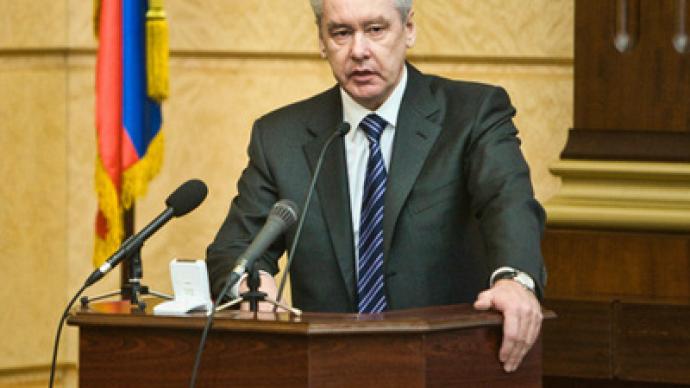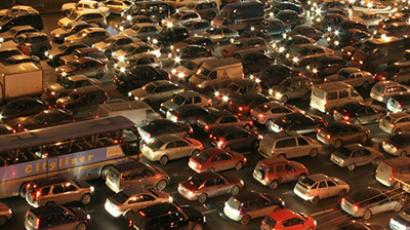New Moscow Mayor marks first 100 days in office

Sergey Sobyanin is marking 100 days since he replaced the omnipresent Yuri Luzhkov as Moscow mayor. While 100 days is certainly a short period (especially compared with Luzhkov’s 18 years in power), it is enough to assess his initial impact.
The WTSIOM research center conducted a poll on Muscovites’ attitude to the new mayor and released the results on Thursday. According to the poll, most people approve of Sobyanin’s actions. Only 19 per cent said they were not happy with his work.However, it is important to assess not only the perception of the population of the overcrowded capital city, who could still be too excited to be seeing the possibility of positive changes for the first time in many years.It is worth remembering that in the very beginning of his service on the mayor’s post, Sergey Sobyanin outlined a number of tasks that he saw as top priority. These were the social guarantees to pensioners and workers within the budgetary sphere, the transport situation and the need to overcome corruption. All these issues were dealt with within the 100 days, though probably in a rather ad hoc manner.The new mayor started laying out plans to solve the transport problems from the very beginning. Among these plans were introducing automated traffic control systems instead of human inspectors, re-building the road system and improving its quality, and even closing the non-authorized roads leading to some new buildings, such as shopping malls on the city’s outer ring road. After one month in office, the new mayor said he had managed to complete a deep revision of the city budget that allowed the raising of expenditure for road construction from 60 billion rubles to 200 billion rubles. This will allow the city to build the automated traffic system for public transport based on Russia’s own satellite navigation system, GLONASS. The first stage of this plan will be completed in 2011 the mayor said after meeting Russian President Dmitry Medvedev in late November. However, he did not specify what this stage will be.Plans to optimize the city management and to fight corruption were also made for 2011. A special city target program was developed for 2011-2013, which included the reform of the city’s executive power bodies, the system of realization of powers and the system of state services with special attention to countering corruption. During the first year of the program the administration planned to develop and adopt the corresponding laws with real-life implementation of the decisions in 2012 and monitoring of the effects and correcting the results in 2013.The reality, however, altered these plans.During one of the first inspections of the city, the new mayor pointed out that the kiosks and fast food stands were too crowded, disorganized and dirty. He ordered the owners’ papers be checked and that illegal constructions be cleared. Also, Sobyanin fired two heads of district administrations where the chaos in retail trade was most severe. The next day, city authorities assisted by police razed thousands of kiosks, drawing protests from business owners and criticism from the public. Some even threatened the new mayor with legal action, although this never eventuated.The closure of many kiosks and illegal markets prompted a tightening of immigration control and disclosed the rather poor situation in this sphere. Sobyanin pointed out the lack of transparency in the sphere of registration and licensing of the migrants, and demanded that order be restored in the sphere. Police raids that followed revealed illegal dormitories in cellars and abandoned subway trains, where thousands of people from Central Asia lived and worked in horrible conditions. This operation, however, was interrupted by the lengthy Russian winter holidays and then replaced by other news.The other obvious success reported by the mayor within the first three months was the closure of over 400 illegal gambling arcades, a step that the previous city authorities had failed to perform for almost a year.The new mayor has already begun to make changes in the multibillion-dollar Moscow property system. Firstly, it was announced that the Bank of Moscow – a commercial bank partially owned by the Moscow government and servicing the city’s needs – would be sold to the state giant VTB-24. The deal is still in the works, but once completed it will seriously lower the city administration’s liabilities and probably the potential for corruption.The mayor also voiced the intention to privatize more of the stock of commercial companies owned by the city government. Of the 433 companies fully- or partially-owned by the city, about 200 will be privatized, including some major enterprises, such as Vnukovo Airport. The money from privatization will go into the social sector and road building.Yet another ambitious program announced by the new mayor was the construction of new Metro stations. Sobyanin ordered an increase in the length of Metro lines by 50 kilometers by the year 2015, and the building of stations faster and more effectively. Sobyanin also plans to replace the director of the Moscow Metro, Dmitry Gayev, whom prosecutors accuse of violating safety rules and receiving illegal income from government property.














